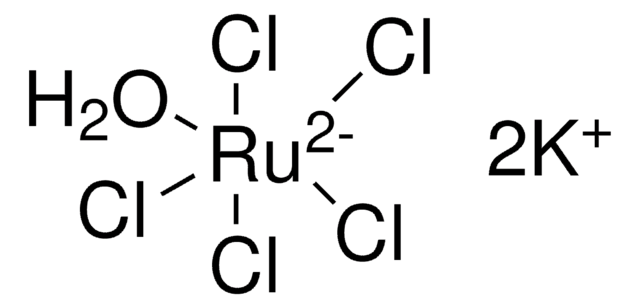334537
Potassium perruthenate
Synonym(s):
Potassium ruthenium oxide, Potassium ruthenium tetraoxide, Potassium tetraoxoruthenium
About This Item
Recommended Products
form
solid
Quality Level
reaction suitability
reagent type: oxidant
concentration
≥49.0% (gravimetric)
solubility
H2O: slightly soluble(lit.)
SMILES string
[K+].[O-][Ru](=O)(=O)=O
InChI
1S/K.4O.Ru/q+1;;;;-1;
InChI key
RDFCRPAXZNYVJH-UHFFFAOYSA-N
Looking for similar products? Visit Product Comparison Guide
Signal Word
Danger
Hazard Statements
Precautionary Statements
Hazard Classifications
Eye Irrit. 2 - Ox. Sol. 2 - Skin Irrit. 2 - STOT SE 3
Target Organs
Respiratory system
Storage Class Code
5.1B - Oxidizing hazardous materials
WGK
WGK 3
Flash Point(F)
Not applicable
Flash Point(C)
Not applicable
Personal Protective Equipment
Choose from one of the most recent versions:
Already Own This Product?
Find documentation for the products that you have recently purchased in the Document Library.
Our team of scientists has experience in all areas of research including Life Science, Material Science, Chemical Synthesis, Chromatography, Analytical and many others.
Contact Technical Service










